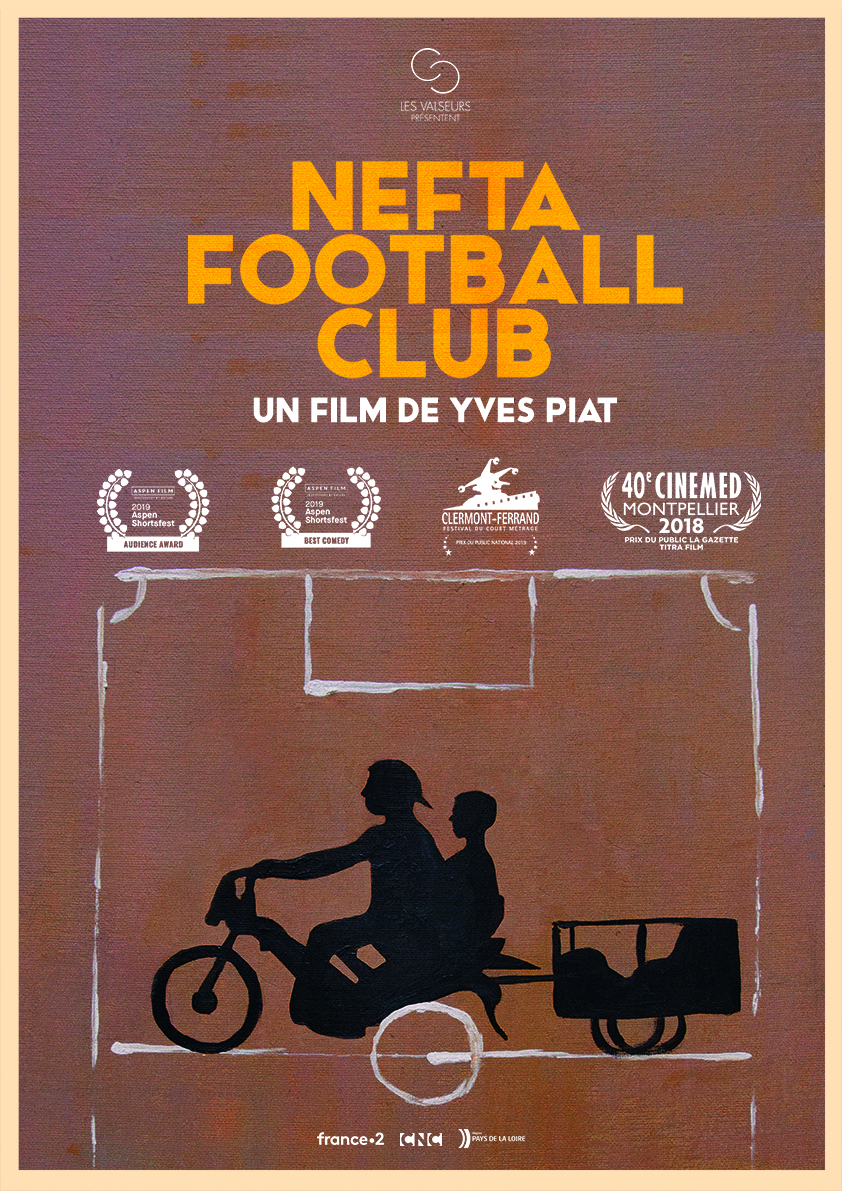
Today we begin revealing some highlights from our 2019 lineup, with the full slate to be announced in the weeks to come. First up, Yves Piat, director of the funny and charming Nefta Football Club, whose synopsis reads: “In the south of Tunisia, two football fan brothers bump into a donkey lost in the middle of the desert on the border with Algeria. Strangely, the animal wears headphones over its ears.” We spoke to Yves recently about the film.
James McNally (JM): Your young actors are remarkable. How did you find them?
Yves Piat (YP): Complicity between the boys was one of the features I was searching for. At first, I cast children from wealthy families. They were used to playing in ads, but their acting didn’t fit what I was expecting for this film. I decided to cast children from a poor neighbourhood of Tunis. I met Eltayef [Dhaoui], who plays the elder brother, on the second day of casting. He was very motivated and was always on time, unlike many children from the streets who often sniffed glue before coming to the casting auditions. I saw hundreds of them and finally chose Eltayef because he was very professional. A great complicity started between us. On the set, Eltayef was incredibly dedicated to the film; he had a sense of rhythm and he understood very quickly what I asked him. Every take was good and he was never tired. This child who is now a teenager was really impressive and incredibly kind!
Regarding little Dali [Mohamed Ali Ayari], the other brother, it was a complete different story. I met him a few days before shooting while I was walking in Tunis with Raja Kader, my translator. I wasn’t really satisfied with the young man initially cast for this role. So, as we finally ended up in a dance classroom where there was this boy, Dali, twice as small as the other boys since he was only 7 years old, but incredibly free from inhibitions. I was amazed by his presence and asked his father if he wanted his son to appear in a film shot outside of school, in south Tunisia and during the holidays. He said yes immediately.
We rehearsed the week before the shooting, because both of these children had never made a film or even been inside a cinema. In particular, I had to be sure that once there, Dali, the younger one, was not going to give up. Dali was incredibly pure as an actor but he quickly became tired on set, although he never gave up. Nevertheless, as a 7 year-old child, he was easily distracted by other children, and wanted to leave to play with them. One day, he managed to disappear from the set. Five minutes later, he was coming back on a bike he probably found in the village near the film location. He brings the freshness and the innocence that I was looking for to this character, but it was really difficult to work with such a young actor.

JM: It’s an unusual story. Was it based on anything that happened in real life?
YP: Many things have inspired the movie. First, a personal experience coming from my childhood. I was 14. At this time, I often snuck out to forbidden places, with flashlights, with my best friend. One day, we found a twisted spoon, a camping stove and thousands of little plastic bags full of white powder. We thought it could be drug material, and we decided to take all this “loot” on our motorcycle. Eventually, since we didn’t know what to do with it, we dumped it in the river without really thinking about what we were doing. Our decision may have cost somebody’s life, or something else important. It’s a story I kept for more than 30 years now. This is how everything started.
Also, I wanted the movie to take place on the border between Morocco and Algeria because I was amazed by the impressive landscapes I saw there. I started imagining a film where the desert would play a great part in the story. Border zones are often dangerous, no man’s lands, going from one state to another.
Regarding the story about the donkey and the Walkman, it’s a true story even if smugglers actually record whistle sounds and not music as presented in the movie. I found it funny to bring in this misunderstanding with the music. And for the football field, the idea came to me after seeing all these kids playing football all along my trip, from north to south Morocco. All these little stories stayed somewhere in my mind and finally merged into one, the one we tell in Nefta Football Club.
JM: What are you working on next?
YP: I am currently working on a feature film taking place in Jerusalem. An Israeli diplomat suffocates to death while eating lamb, a few days before a peace agreement is to be signed. The forensic investigators discover an Israeli bullet in the diplomat’s aorta and the police investigation reveals that the lamb came from the Palestinian territories. The American emissary in charge of the success of this peace agreement has to handle the situation with extreme caution.
Shorts That Are Not Pants Festival 2019 takes place November 15-16 at 401 Richmond. Early Bird passes are available NOW!
